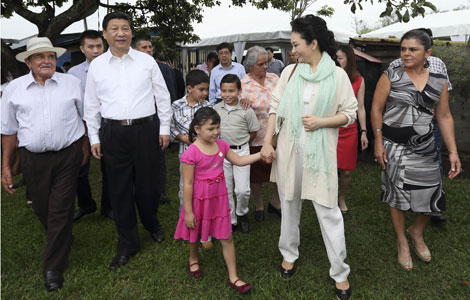Asia's cooperation insufficient
Updated: 2013-04-08 07:57
By Stephen P. Groff (China Daily)
|
||||||||
From the top down, there are also major initiatives that could, if followed through, boost the region's economic growth in trade, investment, and finance.
The Trilateral Investment Agreement signed between China, Japan and the Republic of Korea will see negotiations of a three-way free trade agreement. In addition, the ASEAN+3 emergency financial safety net, the Chiang Mai Initiative Multilateralization, doubled in size to $240 billion last year. India has also offered to lead in creating a financial safety net for South Asia.
In Asia, financial integration lags trade integration. But as advanced economies restructure their fiscal balance sheets, Asia's financial integration will deepen as markets work to intermediate more of the region's vast savings, particularly through expanding local currency bond markets. This can help support infrastructure development, particularly the massive infrastructure projects requiring public-private partnerships.
With this in mind, a $485 million ASEAN Infrastructure Fund was established last year - aiming to leverage more than $13 billion in infrastructure financing by 2020. Nonetheless, Asian markets remain more closely integrated with global markets than to each other.
In general, before policymakers fully commit to cooperation, they must balance the potential benefits of regionalism against its potential pitfalls.
For example, closer ties may have reduced income disparities in Asia, but they may also have contributed to widening domestic inequality. Free trade agreements can divert trade from lower cost suppliers, or cause workers to lose jobs as wage increases or exchange rate appreciation drive low wage industries elsewhere. Financial assets allowed to cross borders yield returns only to a tiny share of the urban population. Indeed, income inequality has worsened in many Asian countries. The potential social ramifications make authorities and politicians skittish.
Integration is different than cooperation. New opportunities drive the natural market-driven economic integration process in Asia. This will continue. It comes with benefits and risks, so cooperation must deepen so that countries can better manage the risks without jeopardizing its benefits.
Ironically, Asia's relative resilience may actually delay deeper regional economic cooperation, and that would be detrimental. Governments must continue to push forward, both bottom-up and top-down. A more balanced approach can ensure the benefits of integration are preserved through cooperation, avoiding the pitfalls such as those facing advanced economies today.
The author is the vice-president for East Asia, Southeast Asia and the Pacific at the Asian Development Bank.
Most Viewed
Editor's Picks

|

|

|

|

|

|
Today's Top News
Relationship 'relaunched'
Good start expected for summit
Xi, Mexican president discuss bilateral co-op
Cooperation to drive mutual growth
Chinese president arrives in Mexico for state visit
China is victim of hacking attacks
US to be largest trade partner
China joins fight against hacking
US Weekly

|

|















